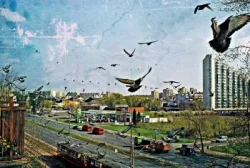When I came to Warsaw for the first time I was fascinated with its scale. I wasn't captivated so much by the size of the city itself as by the amount of space it has. Warsaw is a vast city with wide streets and huge parks. Lisbon, on the other hand, is a very old city with high-density housing. It is located on seven hills and it is on a big river, which is spanned by bridges several kilometers in length. Warsaw is flat... Your eyes can reach the horizon. Some time after my arrival I started to feel disappointment, which was caused by the flow of time. It was simply nostalgia and homesickness. In addition to that, my heart opened and began to see what was Warsaw like and what it could be like. Warsaw is a city which is undergoing transformation and which has a huge potential – and that's why it is fascinating. People who live here are interesting and they make Warsaw even more attractive. This all motivates me to take pictures of this city.
Most of the buildings here are heavy in form but if you know how to look at them their forms become light. Every city in the world looks more beautiful when the sun is going down and when buildings are well-kept and freshly painted. So when they are not freshly painted it is me who paints them!
There are also flavors of Warsaw. The more I delight in the taste of Polish cuisine the more I appreciate Portuguese cookery – as if they complemented each other.
Portuguese cuisine is very varied – it has all the characteristics of Mediterranean cookery and it includes e.g. meat, fish and seafood.
There are few countries which can take pride in even 1/3 of this variety. We owe it to our history. Portugal was once an empire and because of that our cuisine is influenced by African, Indian, Brazilian and Japanese cookeries. These influences manifest themselves not only in the art of cooking but also in the way of seasoning dishes.
The contact between cultures was reciprocal. As far as Japan is concerned, some of the most popular Japanese dishes have Portuguese origins e.g. tempura, which was introduced to the Japanese in the 16th century by Portuguese missionaries (who founded e.g. Nagasaki). Tempura is a typically Portugal way of deep frying. The very word comes from Latin “tempo,” which means “time,” the time of Lent when Christians abstain from eating meat. “Tempura” is also the variation on the word “tempero,” which means “dressing” in Portuguese.
You can try excellent Portuguese food in the Portuguese restaurant, Portucale. Some dishes can be prepared at home but not all of them – it's because some ingredients are not available in stores. There are dishes which can be adjusted to Polish conditions. You just need to replace Portuguese fish or sausages with the most similar Polish products.
I know the cooking preferences of Poles and I am sure that many gourmets would appreciate Portuguese food. Portuguese cuisine is not only tasty but also diverse, letting you choose from fish, seafood, fried and cooked meat etc.
What's missing in Portugal cookery are Polish salads.
Portuguese wines are one of the finest in the world and they can easily satisfy the palates of Poles who like good alcohols. In Portugal these wines are really affordable; however, they are rather expensive in Poland. That's why it's worth going to Portugal...
If you visit Portugal you will also discover that this country is very different from the rest of Europe. It has a different architecture and a unique climate – Mediterranean heat is moderated by Atlantic breeze. Portuguese people are calm and even though they smile often they tend to be melancholic and nostalgic. They resemble fado, this magic music which has won the hearts of Poles. I have heard several fado concerts in Warsaw and I am glad that Warsaw people are sensitive to this type of music and that they can sense the melancholy hidden in its melody.
The Portuguese are like fado and they are proud of it. They are attached to their fatalism.
They don't like noise.
We need contemplation. We need to stop, sit down and contemplate. Everything is inside of us. Emotions develop in silence.
Text by: Gonçalo Franco
Translation by: Krystna Szurmańska
Gonçalo was born in 1974, in Lisbon. He is a photographer and he runs the site: www.goncalofranco.com







































